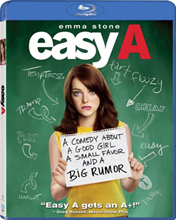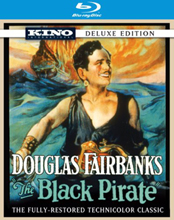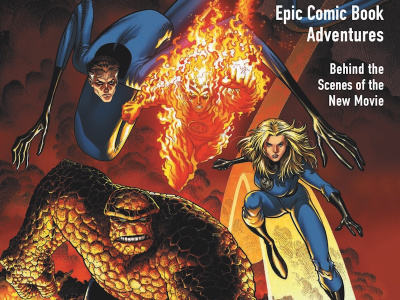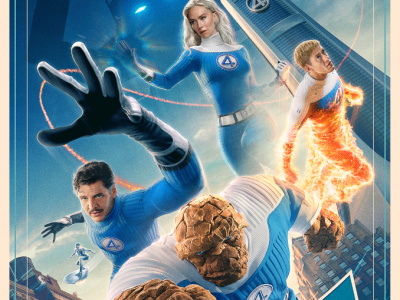
This week it’s the “TV on DVD” category that leads the way with the debut of the final five episodes of Caprica, the complete Family Guy Star Wars spoof trilogy, and the long-awaited return of new Futurama episodes, while “Theatrical Movies” provides the best romcom of the year, Oliver Stone’s Wall St. sequel, and Angelina Jolie in Salt proving that carrying a stunt-heavy action film is no longer strictly the province of the male gender.
TV on DVD
The final five episodes of the BattleStar Galactica spin-off/prequel Caprica are being released first on DVD, two weeks before they air in a mini-marathon on the SyFy channel. Caprica: Season 1.5 (Universal, 394 min., $49.98) will give the dedicated fan base of this cult series its first chance to see the last five episodes of the cancelled show (see “Caprica Ends on DVD First” as well as four other “Season 2” episodes that were broadcast). While Caprica never approached the success of the revived BattleStar Galactica, more than a million viewers watched the last episode of Caprica aired by SyFy, which means there are plenty potential buyers for this release.
But even more folks will likely want to experience the lighter side of “the dark side” with the final installment of the Family Guy parody of the original Star Wars Trilogy, Family Guy: It’s a Trap (Fox, $22.98, BD $29.98). The only thing better than the last segment of this hilarious, over-the-top spoof is the Family Guy: The Laugh It Up Fuzzball Trilogy (Fox, 3 discs, $34.98, $39.98), which includes all three installments.
It really is a great week for those who enjoy the best of TV animation. One of the few releases that can actually top the Family Guy Star Wars parodies is Futurama Vol. 5 (Fox, 538 min., $29.98, BD $49.98), which collects the first 13 episodes of the revived science fiction animated series created by Matt Groening. While the overall quality of this season might be slightly lower than the first two, it does include two of the very best Futurama episodes yet, “The Late Phillip J. Fry” and “A Clockwork Origin.” At its best Futurama is light years better than any American animated series not created by Matt Groening—All glory to the Hypnotoad!
Vintage releases this week include Once an Eagle (Timeless Media, 420 min., $19.98), a 1976 mini-series based on a novel by Anton Myrer about two disparate American, who start out as friends, but end up as desperate enemies, and The Virginian: The Complete Second Season Collector’s Tin (Timeless Media, 2,250 min., $79.98), the long-running (1962-1971) NBC western series starring James Drury and Doug McClure. The Virginian’s Second Season included thirty 90-minute episodes. For those who can’t get enough of 1950s & 60s sitcoms, there is The Andy Griffith Show: 50th Anniversary Best of Mayberry Collection (
Also due out is The Secret Life of the American Teenager: Volume 5 (Disney, 602 min., $39.99), which includes 14 episodes of the ABC Family series created by Brenda Hampton (7th Heaven).
Theatrical Movies
Tom Cruise turned down the thriller Salt in favor of Knight and Day (see “DVD Round-Up: Week of November 30th”) because he thought the stunt-filled Salt was too much like his Mission Impossible movies. Cruise’s decision cleared the way for Angelina Jolie to take over the action-packed role of a CIA Agent who is accused of being a KGB mole. While Knight and Day was a poorly reviewed box office failure, Salt (Sony, “PG-13,” $28.96, BD $34.98), not only demonstrated that Angelina could handle the lead in a realistic espionage-themed action thrill ride, it got a 61% positive rating from Rotten Tomatoes also did quite well in theaters where it earned nearly $300 million worldwide.
Emma Stone, who won a starring role in the new Spider-Man reboot, stars in Easy A (Sony, “Pg-13,” $28.95, BD $34.95), a sly, but slight teenage romantic comedy about a “good girl” who pretends to be “bad” in order to help out a fellow student. Stone is the latest shining star in the illustrious tradition of wise and witty teenage school girls that goes back at least as far as Diana Lynn in the Miracle of Morgan’s Creek. 2010 was a pretty bad year for romcoms, but Easy A was a sparkling exception, the best teenage high school comedy since Clueless.
Wall Street: Money Never Sleeps (Fox, “PG-13,” $29.98) is Oliver Stone’s sequel to his original satirical “hymn to greed” from the 1980s. Money Never Sleeps is set during the financial crisis of 2008 and features the “takedown” of a major Lehman Brothers-like financial firm. The economic pain of the deep recession triggered by the Wall St. financial meltdown is still very much with us, and this painful subject matter was probably the reason that the film (like so many of the Iraq War movies) was not nearly as successful at the box office as its predecessor. Stone assembled an excellent cast including Michael Douglas, who returns as a temporarily chastened Gordon Gekko, and tackled a subject of paramount importance, but thanks to endeavors such as his Kennedy assassination film (JFK), the director’s credibility has been rendered questionable over the years, and his “Odets-on-steroids” agitprop style works against him this time as a more sober and thorough examination of Wall St. malfeasance might have better served the subject at hand. Still, Money Never Sleeps is a film that deserves better than the middling reception it got from both critics (57% positive on Rotten Tomatoes) and audiences ($130 million at the box office).
Also out this week are two genre films that manage to be a little bit better than might be expected--the highly kinetic dance movie sequel Step Up 3 (Disney, “PG-13,” $29.99, BD $39.99), and Devil (Universal, “PG-13,” $29.98, BD $39.98), a quasi-Hitchcockian exercise in horror produced by M. Night Shyamalan. In this high concept supernatural thriller with a setting as limited as the Master of Suspense’s famous Lifeboat, five people are trapped in an elevator in a
Anime
It’s a very slim week in this category with just two releases of new (to the
The single re-priced bargain release of the week is Tenchi Muyo GXP: Complete Collection (Funimation, “13+,” 650 min., $39.98), the 26-episode science fiction harem adventure comedy series from 2002.
Classics on Blu-ray
Douglas Fairbanks’ swashbuckling epic The Black Pirate (Kino, 94 min. $34.95) is the latest silent film to be released on Blu-ray. Produced in the early 2-strip Technicolor process, which provides a muted color palette that was at the time compared to Old Master paintings, The Black Pirate is an excellent candidate for the hi-def treatment. Re-mastered from an excellent 35mm print, this is as fine and visually sharp a version as we are ever likely to see, even if the colors are more muted (and at times faded) than they probably appeared when the film unspoiled in theaters in 1926. Interestingly The Black Pirate never shies away from depicting the casual cruelty and extreme brutality of its pirate hordes. The buccaneers in this film are (somewhat surprisingly for those who are unaware of the rich tradition of silent films) racially diverse, exotically costumed, richly tattooed, and uniformly grimy. Anyone who is interested in the rich history of pirate films should definitely check out The Black Pirate, a film that continues to exercise a considerable influence on the genre.
Also, unlike the case with so many older films, there is more than enough surviving material from The Black Pirate to create some fascinating extras including 18 minutes of outtakes with commentary by film historian Rudy Behlmer as well a 75-minute “sound” version of the film narrated by Fairbanks (though the silent version with an excellent version of the original 1926 score by Mortimer Wilson, is definitely the best way to view the film).











